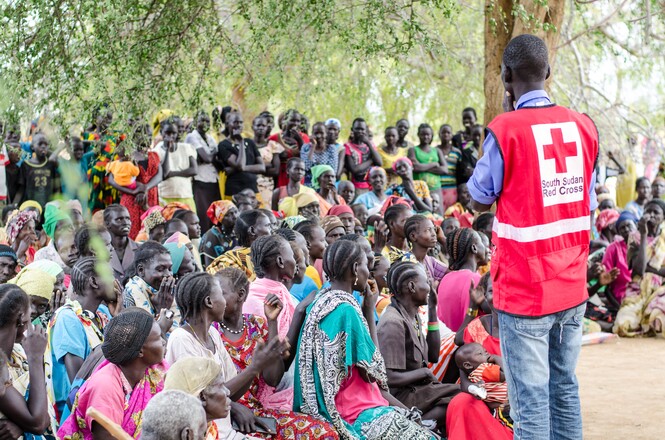
As auxiliaries to their public authorities and grounded within the communities they serve, National Societies are well placed to support law and policy development – a role that is increasingly being recognised.
With support from the German Ministry for Economic Cooperation and Development, and the Foreign, Commonwealth and Development Office of the United Kingdom through the British Red Cross, IFRC Disaster Law is supporting National Societies in the region with significant law and policy work that will help to build resilience, keep communities safe and save lives.
The South Sudan Red Cross is supporting the Ministry of Humanitarian Affairs and Disaster Management in developing a DRM Bill. Following preliminary engagements and the development of a Zero Draft Bill in 2021, consultative sessions were held with ministries, parliamentarians, and international agencies in March 2022. The DRM Bill is currently being revised to take into consideration the comments provided during the consultations and it is expected it will be shared with the Ministry of Justice for its further presentation to Cabinet at a validation session later this year. Over the next few months, state-level consultations are planned with the state government to enhance the contents of the Bill and ensure that it addresses the country’s current needs.
In Uganda, after successfully advocating for the review of their constitutive act, culminating in Parliament passing the new Uganda Red Cross Society Bill, the Uganda Red Cross continues to engage with the Office of the Prime Minister to develop a DRM Bill and has been requested to provide support in a consultancy for the development of the DRM Bill. During a workshop on disaster risk reduction and climate-smart legislation, Red Cross engaged with the Parliamentary Forum on disaster risk reduction and the Parliamentary Committee on Presidential Affairs to advocate for the need to develop climate-smart legislation in Uganda. URCS held a National Adaptation Symposium with Civil Society Organisations and members of the Parliamentary Committee on Climate Change.
Malawi Red Cross Society continues to engage with the Department of Disaster Management Affairs on the next steps in the finalisation of the DRM Bill. Malawi Red Cross has also been engaging the Department of Climate Change and Meteorological Services to discuss its support, and the inclusion of communities, in the review of the existing climate change policy.
Engagement in Malawi and Uganda is part of the Risk-informed Early Action Partnership (REAP), which brings together stakeholders across the climate, humanitarian and development communities with the aim of making 1 billion people safer from disaster by 2025. REAP Target 1 focuses on the necessity to better connect the complementary goals of disaster risk reduction and climate change adaptation, with its goal being for 50 countries to have reviewed and integrated their disaster risk management and climate adaptation laws, policies, national frameworks for climate services and/or plans to ensure that they reduce climate change impacts and exposure on people and the environment.
In Zambia, we are supporting the Zambia Red Cross with the development of the Climate Change Bill. Following engagements with the Ministry of Green Economy and Environment, Zambia Red Cross was given the opportunity to provide comments on the current draft of the Climate Change Bill. IFRC Disaster Law was able to provide technical support and Zambia Red Cross presented their comments to the Ministry for their consideration.
For more information on disaster law activities in Africa, click here.